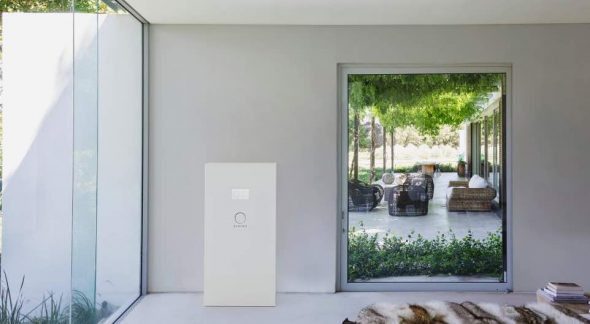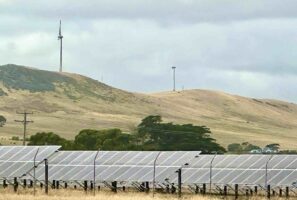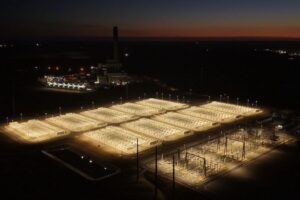The world’s biggest battery manufacturing brands and clean energy lobby groups have signalled they will fight proposed new guidelines and recommendations that could effectively ban battery storage units from inside homes and garages, saying the restrictions are over the top and don’t conform to international standards.
Standards Australia is believed to be preparing the release of new standards that would effectively force most battery storage units to be put in a free-standing and fireproof enclosure, possibly adding thousands of dollars to the cost of installation and making it uneconomic.
As a precursor to that move, Queensland workplace regulators unveiled new recommendations last week that suggested no battery storage units be installed inside homes and garage or adjoining sheds, and instead be put in separate enclosures.
The restriction appears to apply to all battery storage units, and not just lithium chemistries.
Some in the industry have branded the suggestions as ridiculous.
“If you’re going to ban the installation of all battery storage in the home, you might as well ban all laptops,” says Richard Turner, the CEO of Adelaide based Zen Energy, which partners with one of the industry pioneering battery storage makers, Greensmith.
“It’s just a ridiculous position for this country to be in when we have the best renewable energy resource to harness and individuals can basically be energy independent in their own homes.”
The industry fears that even if these proposals are not formally adopted and become law, they could lead to changes in insurance premiums and so become an avoidable and de-facto requirement if they remain guidelines. This puts the multi-billion industry at risk, virtually before it has got going.
The proposal have sparked a volley of protest from battery storage manufacturers, energy experts, installers and customers, who say the proposals go way beyond international standards.
International battery storage leaders Sonnenbatterie, LG Chem and BYD say they have installed batteries in tens of thousands of homes around the world without incident. They – along with Simpliphi, Tesla and others – have vowed to fight the rules.
All these companies have launched products in Australia in anticipation that it will become the first mass market for battery storage in the world, courtesy of its high electricity prices, the high penetration of solar systems, and as back-up in case of blackout.
Many of these companies use advertising campaigns showing sleek new designs incorporated inside domestic living areas or inside office buildings, like the Sonnenbatterie image above.
Julia Chen, the marketing director for China battery storage giant BYD, which launched a range of household and business products in Australia this week, said the guidelines had serious implications for the solar and battery storage industry.
She said there were no safety issues for placing the company’s lithium iron-phosphate batteries in the garage, as they only “decompose” at temperatures of more than 450°C. She suggested minimum requirements based around international standards.
LG Chem, the leader in the Australian market with about a 30 per cent share, says it has installed 30,000 battery storage units worldwide with no issues. LG Chem’s Jamie Allen predicted a major fight back from the industry.
“This would go far beyond anything else in the world,” he said. “It looks like Australia is going to overcook (the regulations) … it will end up costing the consumers more, potentially adding another $1,000 to $2,000 on system costs, just as the technology is becoming financial interesting.
“It will put up barriers, and slow the market down.”
The two main renewable energy lobby groups – the Energy Storage Council and the Clean Energy Council – have vowed to support industry.
“Requiring home energy storage units to be installed in a contained unit on the outside of a house is unnecessarily restrictive, as long as they meet strong international standards and are installed by an accredited installer to clear guidelines,” CEC chief executive Kane Thornton said in a statement.
John Grimes, the head of Energy Storage Council slammed the Queensland guidelines, which he said appear to have been produced without any industry consultation, were premature.
“This could stop all grid connected battery storage investments in the state of Queensland,” Grimes told RenewEconomy. “To have a blanket ruling that appears to rule out all battery storage, including salt water batteries, is frankly unsupportable. The minister needs to intervene at the earliest opportunity.”
Catherine Von Burg, the CEO of California-based SimpliPhi, says the reaction to battery storage units appears to be a flow-on from concern about a bad batch of Samsung phones.
But while these fires are giving lithium-based batteries a bad name, Von Burg told One Step Off The Grid last week that the thermal runaway that causes them actually has very little to do with lithium and everything to do with cobalt, the cheap – and by some reports controversially sourced – mineral that has become an essential ingredient of rechargeable lithium-ion batteries.
For these reasons, SimpliPhi doesn’t use cobalt, opting instead for the more stable chemistry of lithium-iron phosphate, or lithium ferro phosphate, that is also used by fellow US battery company Enphase and German’s Sonnen, among others.
“Our philosophy has always been, why take renewable energy and store it in something toxic, and then add onto that the risk of thermal runaway and fires,” Von Burg told One Step. “We’re trying to educate the consumer. Particularly considering regulatory policy issues stand to impact the industry.”
Chris Parratt, the head of Sonnen’s Australian operations, says he does not understand why Australia appears to be going in the opposite direction to the rest of the world on battery installation guidelines.
Sonnen uses Sony-made lithium iron phosphate batteries, which he says are purpose-built for use in homes.
“Ours is a very, very safe battery,” Parratt told One Step. “In Europe, we have 30,000 installations and some of those have been around since 2010, and not one fire has happened, no one has been injured. Germany has proved that they can be safe.
“There is a standard being released in Germany that allows for lithium-ion batteries to be installed in homes. So why Australia appears to be going the opposite way, I don’t know.”
Zen’s Turner adds: “The problem is we’ve got such archaic building codes here. When you talk lithium-ion, people don’t understand there are many variations, some are flammable, but many are not flammable, such as lithium-iron phosphate, which is what goes in most homes around the world.
“Yes, there needs to be some accreditation on home batteries. (But) you can’t tar all li-ion batteries with the same brush. There needs to be greater clarification of what’s suitable and what’s not. “









